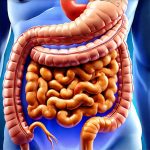Stress is an inherent part of life, woven into the fabric of our daily experiences. From minor inconveniences like traffic jams to significant life events such as job changes or loss, we all encounter stressors that impact us physically and emotionally. While often perceived as a mental phenomenon, stress profoundly affects our physiological systems – and one of the most frequently disrupted is our digestive system. The connection between psychological stress and gut function is deeply rooted in neurobiology, and understanding this interplay is crucial for managing overall well-being. Ignoring this impact can lead to uncomfortable symptoms and potentially long-term health concerns. If you are experiencing persistent issues, consider checkpoints to watch as a starting point for evaluation.
The body’s response to stress initiates a cascade of hormonal changes designed to prepare us for “fight or flight.” This ancient survival mechanism, while invaluable in acute situations, isn’t always beneficial when triggered chronically by modern stressors. During stressful events, the sympathetic nervous system takes charge, diverting resources away from non-essential functions – including digestion. Blood flow is redirected towards muscles and vital organs, digestive processes slow down, and gut motility decreases. This slowdown isn’t necessarily a sign of illness; it’s a natural physiological response geared toward immediate survival. However, persistent stress can create a state where the digestive system remains consistently compromised, leading to various functional issues. Understanding when to seek further evaluation may require recommendations for testing.
The Gut-Brain Axis & Stress Response
The intricate relationship between the gut and the brain, known as the gut-brain axis, is central to understanding how stress impacts digestion. This isn’t simply a one-way street; it’s a bidirectional communication network involving neural, hormonal, and immunological pathways. The vagus nerve, often called the “wandering nerve,” serves as a major highway between these two systems, transmitting signals in both directions. When we experience stress, the brain sends signals to the gut via the sympathetic nervous system, initiating that slowdown of digestive processes. Simultaneously, the gut itself communicates with the brain, influencing mood and emotional state. This means that a compromised gut due to chronic stress can actually contribute to feelings of anxiety or depression.
Furthermore, stress significantly alters the composition of our gut microbiome, the trillions of bacteria residing in our digestive tract. These microbes play vital roles in digestion, nutrient absorption, immune function, and even mental health. Stress can decrease the diversity of the microbiome, promoting the growth of harmful bacteria while suppressing beneficial ones. This imbalance, known as dysbiosis, further disrupts gut function and weakens the gut barrier, potentially leading to increased intestinal permeability (often referred to as “leaky gut”). A weakened gut barrier allows undigested food particles and toxins to enter the bloodstream, triggering inflammation throughout the body – exacerbating stress responses in a vicious cycle.
The hormonal response to stress also plays a critical role. Cortisol, often dubbed the “stress hormone,” is released by the adrenal glands during times of perceived threat. While cortisol has important functions (like regulating blood sugar and reducing inflammation short-term), chronically elevated levels can suppress digestive enzyme production, impair nutrient absorption, and further disrupt gut motility. This creates a state where the body struggles to properly process food, leading to symptoms like bloating, constipation, diarrhea, or abdominal pain. Essentially, stress hijacks the digestive system’s normal functioning in favor of immediate survival priorities. Understanding reflux flare-ups can also provide insight into symptom management during times of elevated stress.
Common Digestive Symptoms During Stressful Times
Digestive slowdown manifests differently from person to person, but some common symptoms are frequently reported during periods of high stress. These aren’t necessarily indicative of a serious medical condition, but they can be incredibly uncomfortable and disruptive to daily life. Recognizing these symptoms is the first step towards managing them effectively.
– Constipation: Reduced gut motility leads to slower transit time, making it difficult for waste to move through the digestive tract.
– Diarrhea: Conversely, stress can also accelerate gut motility in some individuals, resulting in loose stools and diarrhea. This is particularly common with acute stress or anxiety.
– Bloating & Gas: Inefficient digestion leads to increased fermentation of food in the gut, producing excess gas and causing bloating.
– Abdominal Pain & Cramping: Inflammation and altered gut motility can cause discomfort and pain in the abdominal region.
– Nausea: Stress can trigger feelings of nausea, even without any actual illness or infection.
– Changes in Appetite: Some individuals lose their appetite during stressful times, while others experience stress eating, leading to overconsumption of food.
It’s important to differentiate between these stress-induced digestive symptoms and those caused by underlying medical conditions. If symptoms are severe, persistent, or accompanied by other concerning signs (such as blood in the stool, unexplained weight loss, or fever), it’s crucial to consult a healthcare professional. What to expect during a medical evaluation can help ease anxiety about seeking care. However, for mild to moderate symptoms directly linked to stress, lifestyle modifications and stress management techniques can often provide significant relief. Addressing the root cause – the stress itself – is paramount.
Strategies for Mitigating Digestive Slowdown
While eliminating stress entirely isn’t realistic, learning to manage it effectively can significantly reduce its impact on your digestive system. A multifaceted approach that combines behavioral changes, dietary adjustments, and stress-reducing techniques is often most effective. Here’s a stepwise process:
1. Identify Stressors: Begin by identifying the specific sources of stress in your life. Keeping a journal or mindfulness practice can help pinpoint triggers.
2. Stress Reduction Techniques: Incorporate practices like meditation, yoga, deep breathing exercises, or progressive muscle relaxation into your routine. Even short periods of mindfulness can make a difference.
3. Dietary Adjustments: Focus on easily digestible foods during stressful times. Avoid overly processed foods, caffeine, alcohol, and excessive sugar. Consider incorporating probiotic-rich foods (yogurt, kefir, sauerkraut) to support gut health. Meal adjustments can also be helpful during these times.
4. Hydration: Drink plenty of water throughout the day to keep your digestive system functioning optimally.
Beyond these immediate strategies, prioritizing long-term self-care is essential. This includes getting adequate sleep, regular exercise, and maintaining strong social connections. Building a supportive network can provide emotional resilience during challenging times. Remember that consistency is key; incorporating these practices into your daily life will yield the most significant benefits.
The Role of Fiber & Gut Health
Fiber plays a crucial role in promoting healthy digestion and mitigating the effects of stress on the gut. It adds bulk to stool, facilitating regular bowel movements and preventing constipation – a common symptom of digestive slowdown. However, not all fiber is created equal. Soluble fiber, found in foods like oats, beans, apples, and carrots, absorbs water and forms a gel-like substance in the gut, slowing digestion and promoting satiety. Insoluble fiber, found in whole grains, vegetables, and bran, adds bulk to stool without absorbing much water. A balanced intake of both types is ideal for optimal gut health.
During periods of stress, increasing your fiber intake gradually can help counteract the slowdown of digestive processes. However, it’s important to increase fluid intake simultaneously to prevent constipation. Additionally, focusing on prebiotic foods – those that feed beneficial bacteria in the gut – can further support microbiome diversity and resilience. Examples include garlic, onions, leeks, asparagus, and bananas.
Supporting your gut health is not just about diet; it’s also about minimizing factors that disrupt the microbiome. Antibiotics, while sometimes necessary, can indiscriminately kill both harmful and beneficial bacteria. Excessive alcohol consumption and a highly processed diet can also negatively impact the microbiome. By prioritizing whole foods, limiting antibiotic use (when possible), and incorporating stress management techniques, you can cultivate a healthier gut environment and improve your body’s ability to cope with stress. Ultimately, fostering a strong gut-brain connection is a fundamental aspect of overall well-being. Consider how digestive habits can support this, even during disruptive times like travel.


















